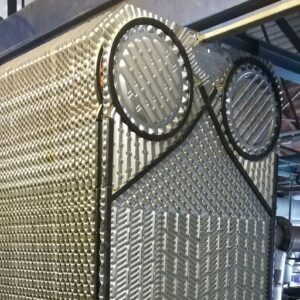
PepsiCo seeks alternative heating methods to classical plate-and-frame heat exchangers to heat up liquid streams at a faster speed and/or higher energy efficiency, as well as lower the carbon emissions and greenhouse gases.
Plate-and-frame heat exchangers invoke natural gas from steam and/or hot water that is generated on-site for the utility heating loop. In these heat operations, water is used as the heating medium, as with many industrial heating processes – water must be heated from ambient temperatures to near boiling for beverage pasteurization. To reach these temperatures, natural gas is burned to heat up the water loop and puts a significant load of carbon-emissions on the thermal process. Furthermore, heat exchangers often do not give immediate response for processes of high product flow rate. The response on water-heated heat exchangers is not fast enough to ramp up the flowing product to pasteurization temperatures to a reasonable tolerance. A heat-up time on the order of magnitude of minutes causes a significant delay in production on lines of commercial speed.
Gas-fired boilers pose distribution losses in the system. Steam is generated at the central boiler(s) at typical plants with heating processes. The boiler output is routed to any unit operation that requires steam with hard piping. This results in non-negligible energy losses by means of heat conduction and frictional loss to the environment. In the case of pasteurization of liquids foods, steam indirectly applies heat to the process – steam is thermally exchanged with a water loop which bears the load of heating the pasteurization liquid. This results in low conversion to thermal energy, resulting in wasted natural gas usage and GHG emissions.
In order to achieve higher production efficiency and better carbon footprint, novel technologies for energy efficient heaters are desired. PepsiCo Beverages North America has set out goals for 75% GHG reduction by 2030 and net zero GHG emissions by 2040. For the longevity and sustainability of the environment, PepsiCo is highly interested in adopting and implementing GHG emission-reducing technologies. A solution/application at any point in the heating distribution – whether it be an innovation to gas-fired boilers or a modular approach to heating – would be open for consideration.
Proposed solutions should achieve one or more of the following objectives:
- Faster heating ramp-up time compared to traditional heat exchangers.
- Invoke equal to/less utilities than conventional plate and frame heat exchangers powered by steam generating boilers
- Decrease distribution losses – apply energy with higher efficiency to the processing liquid
- Net decrease in GHG emission from conventional natural-gas fired heating systems
Solution Requirements
Must-Haves
- Safety measures to protect personnel from any physical, chemical, and/or radiological hazards. Any exposure must fall below OSHA permissible exposure limits.
- Process must provide a deltaT that does not degrade the color or flavor of product.
- Thermal process must be able to run continuously for an extended period of time at line speeds typical of commercial beverage lines (80-100 GPM) without performance losses.
- Thermal process variables must be measurable and controllable, entailing temperature inlet, outlet, flow rate, and heat up time.
- PepsiCo is looking to perform proof of concept testing on pilot and/or commercial scale systems that can be integrated or retrofitted into existing beverage production lines.
- Equipment must be food-grade and meet all sanitary design requirements.
Nice-to-Haves
- Completely eliminates or significantly reduces utility (steam, cooling water, etc.) usage.
- Is capable of automation with existing standard control systems.
- Partnered with beverage filler OEM.
- Utilities/power required for operation can be obtained from renewable resources.
- Modular design.
Preferred Collaboration Types
PepsiCo is open to a range of collaboration types
Submit Ideas
Related Tech Needs
PepsiCo Seeking: Reducing GHG Emissions
PepsiCo Seeking: Next Generation Sustainable Cooler